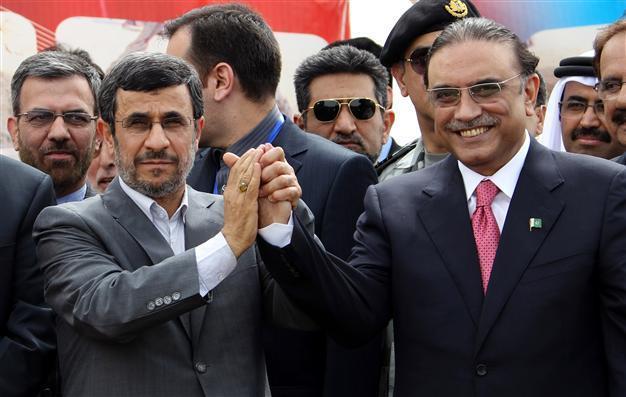Iran, Pakistan leaders inaugurate gas pipeline project
CHABAHAR, Iran - Agence France-Presse

Iran's President Mahmoud Ahmadinejad (C) shakes hands with Pakistan's President Asif Ali Zardari during a ceremony marking the start of work on the 780-kilometre (485-mile) pipeline from Iran to Pakistan on March 11, 2013 in the Iranian border city of Chah Bahar. AFP Photo
The presidents of Iran and Pakistan on Monday inaugurated the construction of a much-delayed section of a $7.5 billion gas pipeline linking the two neighbours, Iranian media reported.
The project was launched at a ceremony on the Iran-Pakistan border attended by Iranian President Mahmoud Ahmadinejad and his Pakistani counterpart Asif Ali Zardari, the reports said.
The two leaders jointly unveiled a plaque before shaking hands and offering prayers for the successful conclusion of the project, which involves the laying of a 780 kilometre (485 mile) section of the pipeline on the Pakistani side, expected to cost some $1.5 billion.
"The completion of the pipeline is in the interests of peace, security and progress of the two countries ... it will also consolidate the economic, political and security ties of the two nations," they said in a joint statement.
Although the pipeline on the Iranian side has almost been completed, Pakistan has run into repeated difficulties, both in financing the project and over a US threat of possible sanctions due to Iran's nuclear activities.
Iran eventually agreed to finance a third of the costs of laying the pipeline through Pakistan, with the work to be carried out by an Iranian company.
Pakistan says it plans to generate 20 percent of its electricity by using the Iranian gas.
The visit marks Zardari's second to Iran since February 27 and comes after officials said a consortium would start work on the pipeline on Pakistani territory despite American warnings.
Analysts said Zardari's Pakistan People's Party would seek to exploit the pipeline to boost its popularity ahead of a general election in May.
"They will say that we signed the deal with Iran despite US pressure and try to convince voters that we can stand against the US," political analyst Hasan Askari said.
Anti-US sentiment runs high in Pakistan and moreover, five years of PPP government have done little to address the country's crippling energy crisis, with severe shortages of electricity in the summer and gas in the winter Iran has promised $500 million to help Pakistan with the cost of building its side of the pipeline, but it is unclear where Islamabad -- grappling with a weak economy -- will find the remaining $1 billion it needs to complete the work.
Iran has the second largest gas reserves in the world, but has been strangled by a Western oil embargo that has seen its crude exports halve in the past year.
It currently produces around 600 million cubic metres of gas per day, almost all of which is consumed domestically due to lack of exports. Its only foreign client is Turkey, which buys about 30 million cubic metres of gas daily.
